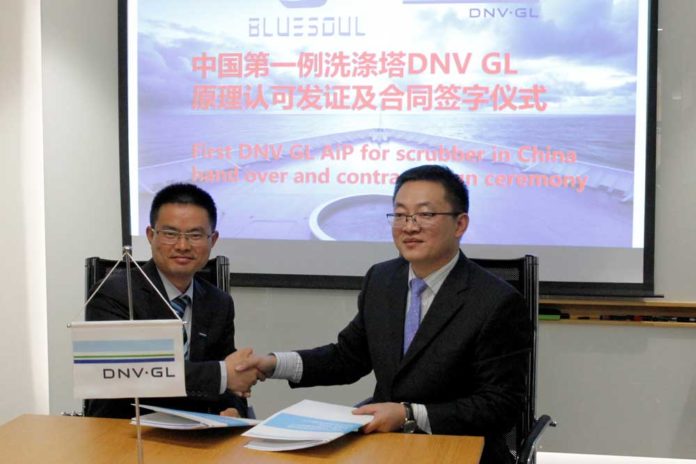
Chinese company Shanghai Bluesoul Environm[ds_preview]ental Technology has received an Approval in Principle (AiP) of DNV GL for its BlueSulf scrubber system.
»The AiP is the first of its kind for a scrubber according to the new DNV GL rule set, and the first for a Chinese scrubber manufacturer«, the Norwegian-German classification announced. It will also provide advisory services to Bluesoul, including hardware-in-the-loop testing, simulations using the DNV GL COSMOSS tool and analyses using computational fluid dynamics (CFD).
»We are very pleased to be the first Chinese supplier to receive this AiP and it demonstrates BlueSulf’s design in compliance with DNV GL class rules requirements, by using the sodium alkali method to clean exhaust gases. We have signed three scrubber projects with Chinese and European owners and we are also in negotiations for several potential retrofit and new building projects«, said Jacky Chow, Chief Operating Officer of Shanghai Bluesoul. He added to be confident that Bluesoul will gain a large share in the scrubber market.
»For us at DNV GL, this is the first project with a Chinese manufacturer, where we will provide such a comprehensive set of services, ranging from the initial AiP to advisory services and the final certification. This project is a global effort and involves our local specialists in China as well as support from scrubber classification and advisory experts based in Norway, Germany and Greece,« said Vincent Li, DNV GL Maritime Regional Business Development Manager in Greater China.
Shanghai Bluesoul’s Bluesulf scrubber is a hybrid system that can switch between open and closed loop mode. This type of system is the most popular at present, as it allows greater flexibility to adjust to changes in water salinity and requirements in different ports. In some areas the use of open loop scrubbers has been prohibited. Able to operate both on seawater and fresh water, the design reduces the sulphur content in exhaust gas to 0.1 % or less, ensuring compliance with the requirements of the Chinese Emission Control Area (0.5 %) that has been in force in eleven ports in China since 1 January 2017 and the upcoming global sulphur cap.
»These regulations have created a new market for scrubbers in the region and we are pleased to be part of that and support customers in developing safe, reliable and efficient exhaust gas cleaning systems,« adds Fabian Kock, Head of Section Safety and System, DNV GL Approval Centre China. A couple of weeks ago, the classification society revealed that it expects »thousands« of scrubber installations in the next years.
DNV GL claims to be the only classification society to offer hardware-in-the-loop testing on scrubber automation systems through its Marine Cybernetics team. These tests are carried out in a virtual environment, enabling experts to check whether a scrubber control system is robust enough to withstand the expected stresses. By the time an automation system goes into operation at sea, its performance has been fully verified down to the individual line of software code.


















